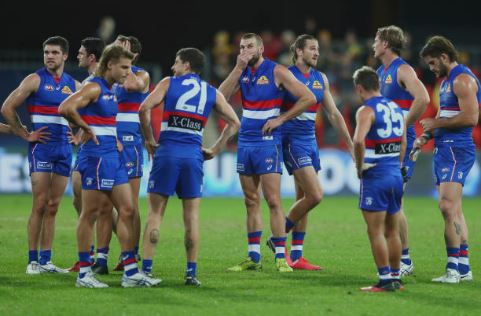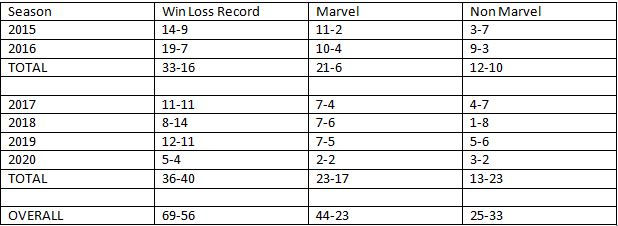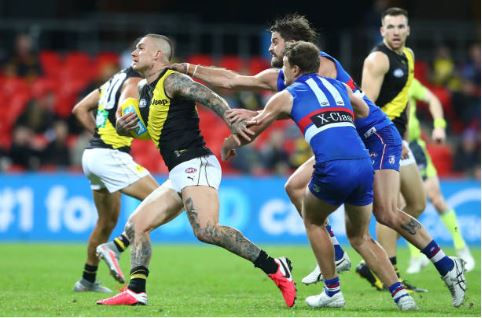5 Things We Learned - Round 9
- Nick Galea

- Aug 1, 2020
- 7 min read
We are now 5-4 after being completely outclassed by Richmond on Wednesday night and it leaves us in a delicate position for the coming weeks ahead.
I mentioned in my introduction of last rounds five things we learned that this challenging stretch of games will determine our fortunes this season and how legitimate we can be. So far we have failed the first test and with two more difficult tasks on the horizon in Port Adelaide and Brisbane we’ve put our season at huge risk.
We had the chance to put three game differential in our win-loss record and find ourselves in the top four but put in a pretty putrid performance instead. That said sometimes a touch up can be a good thing and especially when it comes from a decent side as it still shows you how much further you need to improve, giving us a clear idea of what needs to be done.
1. Slow Starts Are Bloody Killing Us.
Disappointingly, for the fourth time this season when we have lost, we have been belted and it seems quite a noticeable pattern that the opening 10 minutes of our game determine whether we are “on” or “off”. In first quarters this year the Bulldogs have scored 133 points for an average of 14.7 and conceded 163 for an average of 18.1.
Now on raw numbers that 3.4 point differential doesn’t mean much, so this data has to be analysed further. The concerning figure though belongs in the opening quarters of the four games we’ve lost where we have conceded 112 points (average of 28) which is nothing short of disgraceful and it immediately puts us behind the eight-ball. In contrast in our five wins, when we happen to appear “on” we concede 10.2 from a total of 51 points. Bring the heat early and we are in trouble.
At the moment there are three intangibles called attitude, application and resilience, with all three clearly lacking from the outset in our losses and it is perplexing as to why that is the case. Allowing Richmond to take 33 marks in the opening quarter to just our seven highlights many things including the ability to not cover or protect space, to lose sight of your opponent and to hand over control and initiative of the game to the other team.

A bit of soul searching might be needed at the Kennel. Source: Getty Images
2. Consistently Inconsistent
To date our five wins this year have come with a percentage of 188.8%, whilst our four losses have come with a percentage of 49.9%. As such we also have the seventh highest average winning margin (29 points) and highest average losing margin in the competition (46 points). It is a set of damning statistics and ones that highlights us as a side that gets exposed big time when the going gets too tough.
Depending how highly you rate us, we are approaching a stage where we are starting to be identified as front runners and this is simply not good enough when you consider some of the names we have on our list. We certainly have the capacity to be a top four side but we have to actually show that in the first place before we can start trusting them again and take them seriously as a flag threat. It is a talented list but where has that desperation and the ability to rock up to every game no matter the opponent and ladder position gone?
3. Our record outside of Marvel Stadium.
In our first two years under Luke Beveridge we played an electric brand of football which helped us build a fortress at Marvel Stadium resulting in a 21-6 record and a 12-10 record at other venues.
From 2017 onwards both those records have become less than impressive as we have struggled for form, injuries and resulting in a 23-17 and 13-23 stat-line.
It is pretty clear to see that our game plan and style we choose to play works best on fast, dry decks and with clearly not another game to be played in Victoria, and especially at Marvel Stadium; we are up against it during Hub Life.
It has been brought up before and we no doubt are being coached to play a game style that complements our teams strengths but why does it get opened up so easily when opposing teams enforce sustained pressure?
The table below should emphasise how impressive the 2016 triumph was, especially for a non MCG tenant, as no Marvel based team excluding us since Essendon in 2000 has won a flag this century since the introduction of the stadium.
On the other had it highlights our inability to successfully transfer that game style to other venues over the past few years while our advantage has diminished as teams have clearly worked out how to shut us down through intense sustained pressure.

4. Structure and the Forward Combination
I could ramble about Billy Gowers but he is just the one man. Yes his performance was a few levels below par but if you are relying on the 21st or 22nd bloke picked in the side to be a key reason in creating a victory than that’s expecting too much.
One thing Gowers can be satisfied with is his ability to help create space for our other forwards to lead into by doing the little things like blocking defenders, allowing his teammates to fill the hole and take an uncontested mark.
The main question is why hasn’t there been any genuine chemistry or continuity in our forward half compared to our two other lines in the midfield and defence which appear rather settled. There are players who have been or are injured (Dale, Naughton and Lloyd) but it seems regardless who is named (McLean, Lipinski and Gowers) there isn’t anywhere near the cohesion, fluency and promising form at that end of the ground.
Generally when I think of structure it involves having at least two key position players at either end of the ground who have different attributes. We know that Bruce is our option to bring the ball to ground but we currently need a player who leads up at the ball. I am blatantly fed up with the treatment of Josh Schache who doesn’t seem to be given the chance to play a string of games on a consistent basis and is dropped at a moment’s notice for a poor game.
Schache isn’t a world beater. His form fluctuates across games with a solid outing against North Melbourne before a shocker against Carlton (who didn’t). He doesn’t necessarily play to his height but we sorely lack his forward craft and natural leading patterns which make us a better side offensively and straightening up our ball movement. His running patterns up the ground give us a sound option who can deliver the ball efficiently inside 50 which in turn allows Josh Bruce to be exclusively played in the forward 50.
5. Importance of our absentees and is there a lack of on field leadership?
Even with the absence of a few key players in Lachlan Hunter, Josh Dunkley and Aaron Naughton, the Dogs were still able to field our most experienced side since Round One, 2017 but were disappointingly easily dealt with by a team who had 10 players with 30 or less games.
Both sides on Wednesday night suffered from having key players out but the loss was more than simply having a few players unavailable. Does it come down to a lack of leaders on the field?
Hunter is pretty much our on-field coach and you can see how valuable he is, not only with his running power but ability to be that extra man at most contests. We know the 2018 Charles Sutton Medalist is a critical part of how we play but what we lacked other then his hard gut running and ball winning ability was his guidance and direction of players outside the stoppages. Given how he helps to direct traffic for the younger brigade, it isn't hard to see why he was initially appointed Vice-Captain over the summer.
Last season, Dunkley was our leading contested ball winner (314 at 13.65 per game) and that is clearly an area we have declined in this year and especially since 2016. Traditionally we havebased our game plan around aggressive ball movement off half back but despite our decline in contested ball we have remained adequate at scoring from stoppages.
But in recent weeks we have played sides whose midfield groups are either sorely lacking that big bodied midfielder or weren't able to translate its stoppages into scores despite breaking even for the most part. Against Richmond we were found wanting in this area.
In Season 2020 the Dogs have struggled in this area of the ground and it was no coincidence that against a good side side that is organised, was able to restrict our scoring impact from the midfield.
Richmond were ranked 18th heading into this round for scores from stoppages (25%) but first for intercept scores (68%). In comparison the Dogs generated 39% of this season scores from stoppages, ranked eighth in the competition and is 10th for intercept scores at 56%.
On Wednesday night, however, we saw a completely different Bulldogs outfit that we are accustomed to seeing with the Dogs managing just 0.2 and 0.1 from stoppages and centre bounces respectively, a figure of just six percent, well down on our 39% average this season.
Richmond on the other hand generated 3.4 (22) and 2.2 (14) from such scoring methods which resulted in 40% of their 90 points, well above their 2020 stoppage average of 25%.
The absence of both players was huge as they both not only help us control the stoppages but create better ball movement.
In respect to Naughton, he might be only a third year player but there is a strong case that he is already in our top five most valuable and important players. Furthermore, we are all well aware of what he did to Richmond last night, so there's no doubt his inclusion would've made a difference last night.
According to our medical report, Dunkley is a chance for either our Round 10 or 11 games against Port Adelaide and Brisbane. Naughton is still a probable two weeks away while Hunter’s time out of the side for personal reasons remains indefinite. Hopefully all three can return in top condition because boy do we need it if we’re to make anything of this season.

To often Richmond's midfielders like Dustin Martin were given the freedom for to run through a stoppage or ground ball contest.
Source: Getty Images







Comments